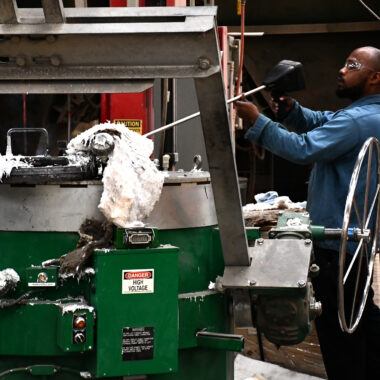Optimizing Results: Casting Aluminum Like a Pro
Wiki Article
Light Weight Aluminum Casting Solutions Introduced: Important Insights and Tips
Exploring the realm of light weight aluminum spreading solutions can introduce a globe of complex processes and nuanced considerations that are crucial for effective results. As we venture into the realm of aluminum spreading solutions, prepare to discover the essential elements that can form the trajectory of your tasks and elevate your understanding of this intricate craft.The Essentials of Aluminum Casting
What fundamental processes are associated with light weight aluminum spreading that develop the foundation of this widely used manufacturing technique? Aluminum casting is a economical and flexible technique made use of in various markets to produce complicated and complex steel components. The procedure starts with the melting of light weight aluminum ingots in a heating system, usually at temperature levels ranging from 1220 ° F to 1670 ° F, relying on the specific light weight aluminum alloy being used. As soon as molten, the aluminum is put into a pre-designed mold cavity, where it solidifies and takes the form of the mold.After solidification, the mold and mildew is removed, and the spreading undertakes finishing procedures such as warmth surface, machining, and treatment layer to meet the called for specs. Comprehending these essential procedures is vital for accomplishing top quality aluminum castings with mechanical residential properties and exact dimensions.
Different Casting Techniques Clarified
Exploring the various methods employed in aluminum casting offers beneficial insights into the diverse methods utilized to achieve intricate and accurate steel elements. One usual approach is sand spreading, where a mold and mildew is developed making use of compressed sand around a pattern of the wanted component. One more method, die casting, involves infusing molten light weight aluminum into a steel mold and mildew under high pressure.Aspects to Think About When Choosing a Provider
When picking a light weight aluminum casting company, examining their experience and expertise is crucial for making sure high quality and integrity in the production process. The company's experience in the area shows their knowledge with different spreading methods, prospective challenges, and ideal techniques. It is crucial to ask about the kinds of projects they have actually functioned on in the past, ensuring they line up with the intricacy and requirements of your own task.In addition, take into consideration the service provider's reputation within the industry. Seek evaluations, endorsements, and case researches that show their capability to supply high-quality aluminum castings continually. A trustworthy company will certainly commonly have accreditations or affiliations with market organizations, showcasing their commitment to quality and adherence to sector standards.
Additionally, evaluate the company's capacities in regards to modification, quantity requirements, and project timelines. Make certain that they can suit your specific requirements and have the versatility to range production as required. Efficient interaction and openness pertaining to prices, preparation, and quality assurance procedures are also crucial aspects to think about when choosing site a light weight aluminum casting company.

Common Difficulties and Solutions
Navigating via the intricacies of aluminum casting processes commonly presents suppliers with a series of obstacles that require cutting-edge services to make certain effectiveness and top quality in manufacturing. One common difficulty encountered in aluminum casting is the development of issues such as porosity, shrinking, or incorporations due to incorrect mold layout or inadequate metal quality.An additional challenge hinges on achieving accurate dimensional precision, particularly for complex geometries. Variations in cooling down rates, mold growth, and product buildings can bring about deviations from the intended measurements. Implementing innovative modern technologies like computer-aided design (CAD) and computer system numerical control (CNC) machining can improve accuracy and uniformity in light weight aluminum casting. Additionally, keeping appropriate control over the melting and pouring processes is important to stop issues like overheating or unequal distribution of the liquified steel - casting aluminum. By buying automation and real-time surveillance systems, suppliers can boost procedure control and lessen variants, ultimately enhancing the overall top quality of light weight aluminum actors products.
Tips for Optimizing Your Spreading Projects
By ensuring that the gating system is properly designed and properly placed, you can boost the flow of liquified aluminum and lower the possibilities of defects in the final spreading. Furthermore, making use of computer simulations can assist in predicting and assessing the flow of steel during the casting procedure, allowing for adjustments to be made prior to actual manufacturing begins.
Verdict
To conclude, comprehending the fundamentals of light weight aluminum investigate this site spreading, various casting methods, aspects to take into consideration when choosing a company, usual obstacles and options, and ideas for maximizing casting projects are crucial for successful results. By adhering to these insights and applying finest techniques, services and people can make sure effective and reliable light weight my site aluminum spreading services that fulfill their details demands and requirements.Recognizing these basic processes is important for attaining premium aluminum spreadings with accurate dimensions and mechanical residential or commercial properties.
When picking an aluminum spreading solution carrier, assessing their experience and experience is important for making certain top quality and reliability in the manufacturing procedure. Efficient interaction and openness regarding expenses, lead times, and top quality control processes are additionally critical elements to consider when selecting a light weight aluminum spreading solution carrier.
Navigating with the intricacies of aluminum spreading procedures usually offers makers with a collection of obstacles that require innovative solutions to guarantee performance and high quality in production. One common difficulty encountered in aluminum casting is the development of problems such as porosity, shrinking, or inclusions due to incorrect mold and mildew style or insufficient metal quality.
Report this wiki page